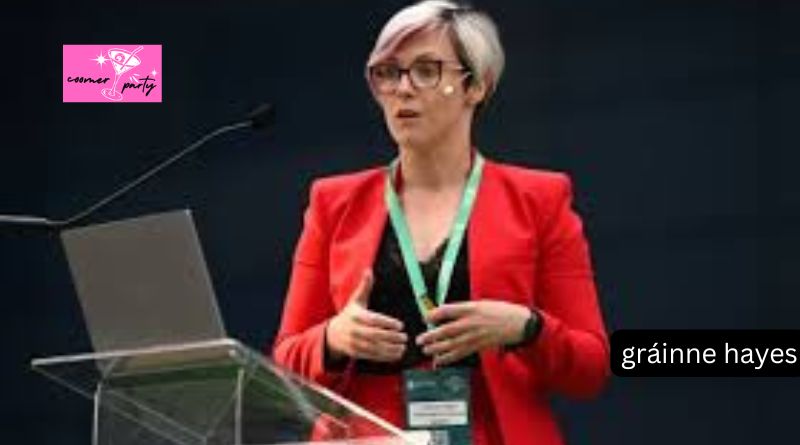In a world where screen time increasingly outweighs playtime, and childhood health concerns are on the rise, few voices stand out as clearly and confidently as that of Gráinne Hayes. Known for her deeply rooted commitment to public health and youth wellness, Hayes is more than just a researcher or educator—she is a passionate advocate for healthier generations. Her journey from student to thought leader in exercise physiology and cardiometabolic health has made her a name to watch not only in Irish academic circles but across the global health research community.
The Early Spark: A Passion for Understanding the Human Body
Growing up in Ireland, Gráinne Hayes showed an early curiosity for how the human body worked, moved, and responded to physical challenges. This passion naturally led her to pursue a Bachelor of Science in Sport and Exercise Sciences at the University of Limerick (UL). Unlike many undergraduate students who explore career paths as they go, Hayes quickly found her niche in combining science with purpose: studying how movement and physical activity impact long-term health—especially among children and adolescents.
Her undergraduate years were the first glimpse into what would become a life dedicated to rigorous science, advocacy for movement, and an unwavering desire to improve the lives of others. After her graduation in 2013, she transitioned seamlessly into various roles at UL—working as a teaching assistant, research assistant, and project manager—all while laying the groundwork for the kind of deeply engaged academic she would soon become.
Academic Growth and a Doctorate in Human Well-Being
Not content with merely applying existing knowledge, Hayes aimed to expand it. Her doctoral research, completed in 2021, was both ambitious and necessary. She focused on “Physical activity, sedentary behaviour and cardiometabolic health in children, adolescents and young adults.” In other words, she examined how the behaviors of youth—how much they move or don’t—can predict and influence serious health outcomes later in life.
Her PhD work was grounded in real-world implications, touching on issues like rising childhood obesity, reduced school-time activity, and the growing normalization of sedentary lifestyles, especially in the digital age. Rather than approaching the topic from a place of blame, Hayes focused on solutions, using scientific inquiry to develop actionable insights that could improve health outcomes across generations.
Teaching, Mentoring, and Building a New Generation of Experts
Following the completion of her PhD, Hayes took on teaching roles at the Technological University of the Shannon before returning to UL as an Assistant Professor of Exercise Physiology. Her return marked the beginning of a new chapter—not just as an academic, but as a mentor, course director, and leader.
Today, Hayes directs the MSc in Sports Performance at UL, a forward-thinking program that integrates modern science, elite-level coaching, biomechanics, and real-world placements. Her leadership in this space is notable not just for its academic rigor, but also for its student-first approach. She’s the kind of professor who doesn’t just deliver lectures; she inspires, guides, and cultivates critical thinkers.
It’s no surprise that students and colleagues alike speak highly of her ability to make complex science feel applicable, relevant, and—perhaps most importantly—motivating.
A Researcher With a Mission: Linking Physical Activity to Public Health
One of the strongest threads running through Gráinne Hayes’s career is her commitment to translating data into real-world impact. Her research doesn’t live in a vacuum. It lives in schools, sports clubs, communities, and healthcare policies. She explores how movement—or lack of it—affects everything from cardiovascular risk to emotional well-being.
Among her most impactful studies are those involving wearable technologies, which track physical activity levels with greater accuracy than traditional self-reporting methods. These devices, when used in structured research, provide a clearer picture of how much young people are truly moving—and how long they’re sitting. With this data, Hayes helps inform strategies that support healthier behavior patterns from a young age, setting the stage for lifelong wellness.
Her work has also taken on new relevance in a post-pandemic world. During COVID-19 lockdowns, Hayes led initiatives aimed at reducing sedentary behavior among remote workers using simple electronic nudges. The results? Participants moved more, sat less, and felt better—proof that even minor adjustments can lead to meaningful improvements in health.
Advocacy Beyond the Lab: Shaping Policy and Practice
What truly sets Gráinne Hayes apart is her commitment to bridging science and policy. Her research doesn’t just appear in academic journals; it informs public health campaigns, school-based interventions, and national guidelines. She collaborates with health departments and educators to ensure that science reaches the people it’s meant to serve.
Her work with Ireland’s Health Research Institute and the Physical Activity for Health Research Centre places her in key decision-making conversations. As both an academic and practitioner, Hayes helps shape the health landscape of Ireland by advocating for evidence-based policies that prioritize youth fitness and mental well-being.
Whether it’s helping schools build better physical education programs or guiding workplace wellness strategies, her research provides the blueprint for change. In this way, she’s not just an observer of public health trends—she’s an architect of healthier futures.
Practicing What She Preaches: Fitness as a Way of Life
What makes Hayes’s message even more compelling is her own commitment to fitness. She doesn’t just study exercise—she lives it. A participant in the 2020 CrossFit Open, she ranked among the top female athletes in Ireland. Her involvement in elite physical competitions underlines a powerful message to her students and peers: health science is personal.
This authenticity makes her relatable, trustworthy, and deeply respected. In a field that can sometimes feel academic and abstract, Hayes remains grounded, showing that a life of movement is both attainable and essential.
Her husband:
Gráinne Hayes was previously married to Nigel Farage, the British politician best known for his role in the Brexit campaign. They met in the mid-1980s when Hayes was working as a nurse and cared for Farage following a serious car accident. Their relationship grew over time, and the couple married in 1988. Together, they had two sons before eventually divorcing in 1997. Despite Farage’s high-profile political life, Hayes chose to remain private, focusing on her career and family. Her personal life has since remained out of the public eye.
Looking Ahead: The Future of Gráinne Hayes’s Work
As health crises evolve and new challenges arise, Gráinne Hayes remains focused on pioneering solutions. Her future work continues to revolve around:
-
Advancing wearable tech for more accurate activity tracking in younger populations.
-
Designing scalable behavior-change interventions for schools and workplaces.
-
Advising national policymakers on best practices for youth health promotion.
She is also increasingly involved in international collaborations, sharing her methods and findings with global researchers and health organizations. Whether through conference presentations, policy briefings, or collaborative studies, Hayes’s work is becoming a global touchstone for youth health and physical activity.
Final Thoughts: A Life of Impact and Integrity
In the ever-changing world of public health and fitness, Gráinne Hayes has carved out a role that is both dynamic and deeply human. She stands at the intersection of science and compassion, armed with data but driven by empathy. Her work reminds us that improving health isn’t about punishment or perfection—it’s about understanding, opportunity, and action.
For every child struggling with inactivity, every teacher looking for support, or every policymaker needing evidence to push forward an initiative, there is someone like Gráinne Hayes working tirelessly in the background—asking questions, testing ideas, and believing in better outcomes.
Her journey is far from over, but her impact is already clear: she is shaping a healthier, more informed world, one study—and one student—at a time.

